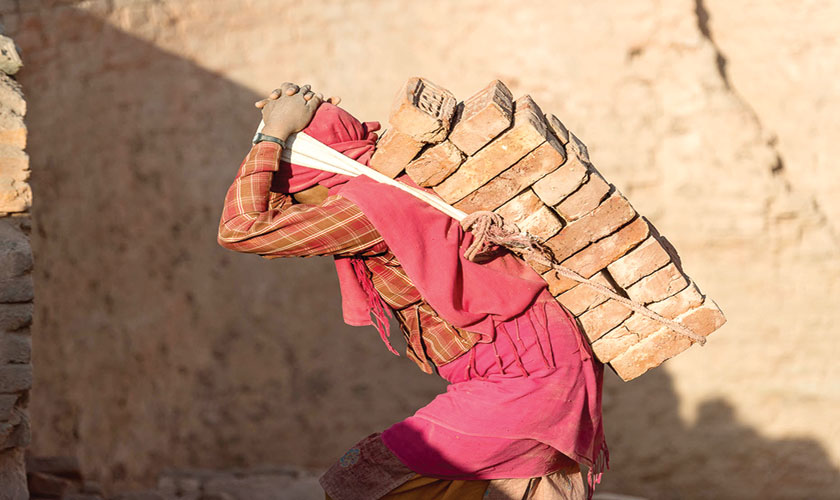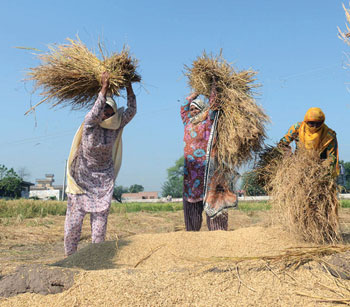Every year, some countries observe May 1st as Labour Day. Keeping this day in mind You! takes a look at the history of Labour Day and some of the organisations in Pakistan who are working tirelessly to bring some change in the lives of women labour force...
Every year, some countries observe May 1st as Labour Day. Keeping this day in mind You! takes a look at the history of Labour Day and some of the organisations in Pakistan who are working tirelessly to bring some change in the lives of women labour force...

How it all started:
1st of May, International Workers’ Day or more commonly known as May Day or Labour Day, commemorates the historic struggle of working people throughout the world. Many are unaware of the fact that the holiday began in the 1880s in the United States, with the fight for an eight-hour work day.
In 1884, the Federation of Organized Trades and Labour Unions passed a resolution stating that eight hours would constitute a legal day’s work from and after May 1, 1886. The resolution called for a general strike to achieve the goal, since legislative methods had already failed. With workers being forced to work 10, 12, and 14 hours a day, rank-and-file support for the eight-hour movement grew rapidly, despite the indifference and hostility of many union leaders. By April 1886, 250,000 workers were involved in the May Day movement. This day is a celebration of labourers and the working classes that is promoted by the international labour movement, anarchists, socialists, and communists. The date was chosen for International Workers’ Day by the Second International to commemorate the Haymarket affair, which occurred in Chicago on 4 May 1886.

In our part of the world:
Pakistan’s first labour policy was devised in 1972, in which May 1st was declared an official holiday. This policy also formulated the creation of the Social Security Network, Old Age Benefit Schemes and Workers Welfare Fund. Pakistan’s constitution also contains various provisions and articles about labour rights.
Even though, the current scenario of the labourers have improved compared to previous times, workers here still do not enjoy as many rights as enjoyed by workers in more developed/industrialized countries.
Our women labour force:
Despite improvements in the labour market in Pakistan, women are still at a disadvantage position as compared to men. According to the latest Labour Force Survey, female labour force participation stands at 24 per cent compared with 82 per cent for men and most of the working women work in the agriculture sector or the informal economy. Apart from the fact that women generally have a lower level of skills and education and the majority of the training for women does not meet employers’ demand, women often face a less favourable working environment such as childcare and workplace harassment.
Here are a few organisations that are fighting for rights of women labour force...
International Labour Organization (ILO):
ILO is a specialized agency of the United Nations (UN) dedicated to improving labour conditions and living standards throughout the world. Established in 1919 by the Treaty of Versailles, the ILO became the first affiliated specialized agency of the United Nations in 1946. It is important to note that Pakistan became a member of the International Labour Organization (ILO) right after its independence in 1947. The ILO Country Office for Pakistan was set up in 1970 in Karachi and later moved to Islamabad. The ILO’s major work in Pakistan has covered a wide range of activities: promotion of International Labour Standards; prevention and elimination of child and bonded labour; job creation through employable skills; mainstreaming gender equality amongst many others. One project by ILO that started in March 2005 and ended in March 2010 was Women Employment Concerns and Working Conditions (WEC-PK)
This was a national project that aimed at enhancing the quantity and quality of women’s employment in Pakistan by working with key ILO’s constituents: government, workers’ organizations, employers’ organizations and civil society.
Another ongoing project is Promoting Gender Equality for Decent Employment (GE4DE). This project was initiated in March 2010 and will continue till 31 October 2016.
It has three main objectives which include strengthening national mechanisms to promote equal employment and opportunities for women, enhance skills and employability of women in rural and urban areas of selected districts and strengthen the capacity of the media to raise awareness on issues related to working women in both the formal and informal economy.
The major outcome of this project is that more than 5000 women have been trained and 80 per cent are productively employed with some working in the formal sector in the textiles, hospitality and services industries, some setting up their own businesses, and some continuing their education.
Pakistan Institute of Labour Education & Research (PILER):
The Pakistan Institute of Labour Education & Research (PILER) was founded on 1 May 1982 by a group of concerned individuals from the trade union movement, academia and various other professions. The organization is dedicated to promoting a democratic and effective labour movement for the overall advancement of a socially just and equitable society where the fundamental rights of people are respected and guaranteed. PILER’s main office is in Karachi but they have a branch office in Lahore as well to make its education, training and advocacy programmes accessible to workers in the provinces of Punjab and Khyber Pakhtunkhwa.
The main course of action at PILER is to initiate and strengthen mobilization and organizations of workers especially women and communities around issues of labour rights. Also, it aims to assist in training and education for effective and sustained mobilization and organization of workers - both in the formal and informal economies. In 2013-14 PILER initiated a project Mobilization for livelihood right in rural Sindh with aims to empower marginalized and vulnerable rural communities. This project basically aimed at women because the majority of rural workers, tenants, brick kiln workers and home based workers of districts Umerkot and Sanghar of rural Sindh are women.

Bonded Labour Liberation Front Pakistan (BLLF):
Because in our part of the world, majority of the labourers are women and usually suffer at the hand of feudal lords who do not give any rights to their workforce. So keeping this situation in mind, BLLF was established in 1988, in a bid to address their issues - mostly women working in the brick kiln industry. The mission of BLLF is total eradication of the bonded labour, injustice, illiteracy, inequality and poverty in South Asia. The organisation indentifies bonded labour in various sectors of economy and works towards their release and rehabilitation. Also, they carry out awareness campaigns against this cruel system especially in those areas that have a large number of bonded labour and child labour.
Aurat Foundation:
Established in 1986, as a national, non-profit, non-governmental organization under the Societies’ Registration Act 1860, Aurat Publication and Information Service Foundation (Aurat Foundation/AF) is committed to create widespread awareness and commitment for a just, democratic and caring society in Pakistan, where women and men are recognised as equals, with the right to lead their lives with self-respect and dignity. Over the last 28 years, Aurat Foundation has come to be recognised nationally and internationally as one of the leading institutions creating, facilitating and strengthening civil society groups and networks for promoting trust and collaboration among citizens to mobilize public pressure for women’s empowerment in the country. Aurat Foundation has its Head Office in Islamabad, and five regional offices in the provincial capitals in Lahore, Karachi, Peshawar, Quetta and Gilgit and 37 Field Offices.